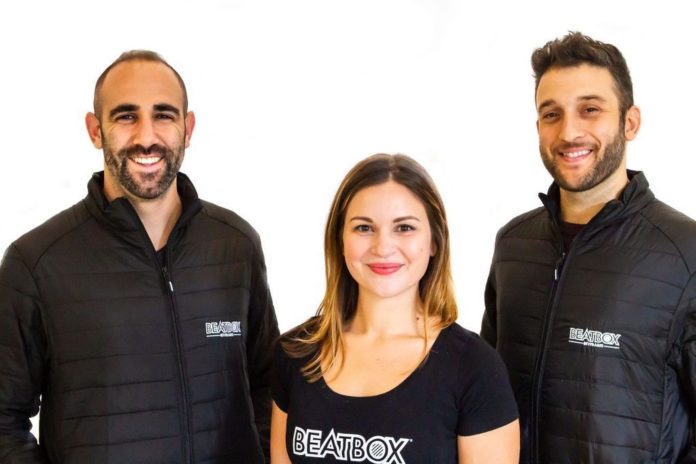Innovation and brand building are both at the heart of BeatBox Beverages. Launched in 2011, this portable wine punch in a colorful Tetra Pak box gained fame after earning investment from Mark Cuban on “Shark Tank.” From there, BeatBox continued to grow by tapping into a number of consumer trends: flavor variety, quality ingredients, convenience and community.
For a look at how this alternative-packing RTD has caught on with consumers, we recently spoke with cofounders Amy Steadman, Brad Schultz and Justin Fenchel.
Beverage Dynamics: You were early with the RTD trend. What did you see in 2011?
Amy Steadman: We started right after Four Loco, when a lot of the trends were catching up to what we saw back then as being next: the variety in flavors and alterative packaging. These trends were taking stuff from the nonalcoholic categories that people loved. You have to remember: our generation did not grow up with just one flavor of Gatorade; we grew up with many.
BD: Your product contains wine but is an RTD — the same category as vodka spritzers. Does the category need better definition?
Brad Shultz: Part of the RTD movement has been these blurred lines. People don’t care about what alcohol is in their RTD as long as they know that alcohol is a sipping-quality spirit, or uses great grapes and other ingredients. People spend money based on things like nutritional or brand appeal.
Justin Fenchel: Some of the spirits-based RTDs use bulk vodka or tequila. That’s crap. So there will be opportunity for brands to set themselves apart by using better-quality alcohol. The most important thing is: Does your RTD taste good? The number-one thing people care about is quality — even more than price or branding.

AS: People really look for those signifiers: gluten-free, low-calorie. No consumer really knows what alcohol is in most of these RTDs. For us, the building of brands and the customer connection, the lifestyle and the community — that’s what sets us apart.
BD: You often mention ‘community’ as key to your success.
JF: We’re all lovers of music festivals and we wanted to capture that in our brand. The events, the social aspect, the connection with consumers — all the experiences that you have at a music festival. We want drinking BeatBox at a music festival to be like drinking wine at Napa: you have that experience for life.
BS: We’ve done the work in building our community. We’re in our seventh year of running our brand ambassador program. People don’t want to hear from brands, they want to hear from their friends and people in their network. You can’t create that overnight.
BD: With digital communities becoming so critical, how important is authenticity nowadays?
JF: Authenticity is everything. We’re all bombarded daily with marketing images. Large companies don’t give consumers enough credit for sniffing out things that are not authentic. Some of the most popular things we have done were memes that went viral. If you’re not authentic, you can’t survive.
AS: We think of authenticity from a leadership perspective. We’re three friends who love music festivals and created a platform for that. You can’t create that without authenticity.
BD: What will the RTD landscape look like after the on-premise world reopens fully?
JF: Even as bars and restaurants reopen fully, people are going to be concerned about who’s squeezing the lime behind the bar, who’s making your drink. RTDs are single-serve, which should help them rule the day. We’re small right now in restaurants, but it’s something we are thinking about more. And we’re at pools and parks as a different way of serving drinks.
BS: Convenience is the ultimate luxury these days. Look no further than Netflix and Uber Eats.
BD: Your RTDs have higher ABV at the same time that low-cal, low-ABV, ‘healthier’ alcohol is trending. Thoughts?
AS: We see a lot of alcohol products marketing themselves as ‘healthy’, and we don’t know whether that’s responsible.
JF: I think that higher-ABV products still have a huge place in the market. Many people still like drinking alcohol to get a buzz. There’s a reason that Mike’s Harder Lemonade outsells Mike’s Hard.
Kyle Swartz is editor of Beverage Dynamics magazine. Reach him at kswartz@epgmediallc.com or on Twitter @kswartzz. Read his recent piece Why RTDs Will Boom in 2021 and Beyond.





[…] The BeatBox Founders Talk Innovation, Brand Building first appeared on Beverage Dynamics. Read Full Story at source (may require registration) Author: Kyle […]
[…] post Interview: The BeatBox Founders Talk Innovation, Brand Building first appeared on Beverage […]
[…] fastest-growing wine was BeatBox Beverages, a bag-in-box wine punch from Future Proof, up a whopping 84.3%.“It’s great to see more and […]